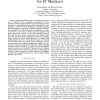Free Online Productivity Tools
i2Speak
i2Symbol
i2OCR
iTex2Img
iWeb2Print
iWeb2Shot
i2Type
iPdf2Split
iPdf2Merge
i2Bopomofo
i2Arabic
i2Style
i2Image
i2PDF
iLatex2Rtf
Sci2ools
136
click to vote
IWQOS
2011
Springer
2011
Springer
Advanced Quality-of-Service signaling for IP multicast
—Supporting Quality-of-Service resource reservations for IP multicast flows is especially advantageous for distributed multimedia applications like video conferencing, 3D teleimmersion, or multi-player online gaming. In response to various limitations of RSVP the IETF developed more flexible signaling protocols within the Next Steps in Signaling (NSIS) framework. But unlike RSVP, the NSIS protocols were designed to consider unicast flows only in order to reduce protocol complexity. This paper presents an extension of the NSIS signaling protocols that allow for QoS resource reservations of IP multicast data flows. We describe the main challenges and discuss the resulting design decisions in detail. Enhancements of an existing NSIS implementation show that the required changes are minimal and do neither affect the unicast protocol operation, nor increase the protocol’s complexity significantly. Instead, all of the advanced features introduced by NSIS, like reliable signaling mes...
| Added | 15 Sep 2011 |
| Updated | 15 Sep 2011 |
| Type | Journal |
| Year | 2011 |
| Where | IWQOS |
| Authors | Roland Bless, Martin Röhricht |
Comments (0)

